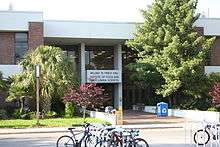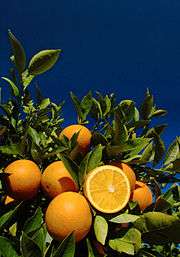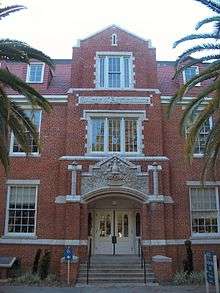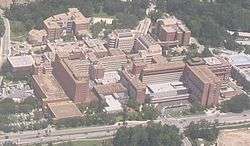Institute of Food and Agricultural Sciences
 | |
| Type | federal-state-county partnership |
|---|---|
| Established | 1964 |
| Dean | Dr. Jack Payne (Senior Vice President) |
Academic staff | 572 (state), 293 (county) |
Administrative staff | 1,102 |
| Students | 5,100 |
| Location | Gainesville, Florida, US |
| Website | www.ifas.ufl.edu |

The Institute of Food and Agricultural Sciences (IFAS) is an agriculture, life science, pathogen, and invasive species research facility in Florida affiliated with University of Florida. It is a partnership between federal, state, and county governments that includes an extension office in each of Florida's 67 counties, 13 research and education centers, several demonstration sites, the University of Florida College of Agricultural and Life Sciences (including the School of Forest Resources and Conservation] and the School of Natural Resources and Environment), the Center for Tropical Agriculture, portions of the University of Florida College of Veterinary Medicine, the Florida Sea Grant program, and the International Program for Food, Agriculture and Natural Resources.
IFAS research and development covers natural resource industries that have a $101 billion annual impact. The program is ranked #1 in the nation by the NSF.[1] Because of this mission and the diversity of Florida’s climate and agricultural commodities, IFAS has facilities located throughout Florida. Starting June 1, 2010 IFAS will be under the leadership of Dr. Jack Payne, who was named Senior Vice President for agriculture and natural resources for the University of Florida on February 26, 2010.[2]
Research
The UF/IFAS research mission is to invent, discover and develop knowledge to enhance the agriculture and natural resources of Florida. Faculty members pursue fundamental and applied research that furthers understanding of natural and human systems. Research is supported by state and federally appropriated funds and supplemented by grants and contracts. IFAS sponsored research awards in the 2008-09 year exceeded $120 million.[3]
The Florida Agricultural Experiment Station administers and supports research programs in UF/IFAS. The research program was created in 1887 by federal legislation known as the Hatch Act, a follow-up to the 1862 Morrill Act that established U.S. land-grant universities. The research programs support approximately 350 full-time equivalent faculty members in 16 academic departments on UF’s Gainesville campus and at 13 research and education centers around the state.
Most IFAS research can be easily accessed via the searchable UF/IFAS Electronic Data Information Source (EDIS).
Food safety
IFAS supports one of the nation's largest collections of food safety facilities and faculty in the country, and is integral in maintaining the National Food Safety Database.
Along with researchers specializing in controlling spread of pathogens such as E. coli and Salmonella, IFAS also has uniquely specialized research programs dedicated to the science of food packaging and a Center for Food Distribution and Retailing.
Cellulosic ethanol
IFAS microbiologist Lonnie Ingram holds several patents (jointly with the University of Florida) on a unique way to produce cellulosic ethanol using a genetically engineered form of E. coli to break down biomass. A cellulosic ethanol power plant utilizing this method began construction in Louisiana in 2007.

Invasive species
Florida is the state most indundated with invasive plant and animal species. Nearly 85 percent of new plants entering the country travel through Miami. As such, much of the UF Department of Entomology and Nematology as well as a Center for Aquatic and Invasive Plants have been dedicated to fighting this problem.
Emerging pathogens
IFAS is part of the University of Florida's Emerging Pathogens Institute. IFAS has been heavily involved in dealing with emerging food safety issues such the recent surge of E. coli and Salmonella infections due to bacteria on fresh produce served at restaurants and grocery stores.
Citrus research
Established in 1917 IFAS' Citrus Research and Education Center is the largest citrus research institution in existence with more than 40 laboratories, 250 employees, and over 220 acres (0.89 km2) of groves and greenhouses.
Avian flu
Dr. Gary Butcher is widely recognized as one of the foremost experts on poultry pathogens in the United States.
Extension

The 1914 Smith-Lever Act provided federal support for land-grant institutions to offer educational programs to enhance the application of useful and practical information beyond their campuses through cooperative extension efforts with states and local communities.
UF/IFAS Extension provides Floridians with lifelong learning programs in cooperation with county government, the United States Department of Agriculture, and Florida A&M. The wide breadth of educational programming offered in each county responds to the local needs of residents, schools, regulatory agencies, community organizations, and industry.
Programs promote sustainable agriculture, teaching environmental stewardship, understanding of food nutrition and safety, consumer and parenting skills, and providing leadership for youth development through programs like 4-H.
By partnering with local government, advisory committees, concerned citizens, commodity groups and the youth of Florida, UF/IFAS Extension creates an important link between the public and research conducted on campus and at 13 research and education centers.
Solutions for Your Life
Solutions for Your Life is the Web site of University of Florida Extension, making IFAS faculty expertise available on-line under such categories as lawn and garden care, family life and consumer choices, agriculture, community development, the environment, and youth development. The web site is focused on providing timely and relevant solutions.
Facilities
In addition to facilities on the University of Florida campus and Extension offices in each of Florida’s 67 counties, IFAS has 1,255 buildings, 3,190,448 square feet (296,402 m²) gross, and 16,591 acres (67.1 km²) throughout the state. These facilities are used for teaching, research and demonstration:
- 16 on-campus academic departments
- 13 Research & Education Centers (REC) located throughout the state
- Florida Cooperative Extension Service offices in all 67 counties (counties operate and maintain)
- 6 Research sites/demonstration units administered by RECs or academic departments
- 5 locations with statewide undergraduate degree programs
Teaching
College of Agricultural and Life Sciences
The College of Agricultural and Life Sciences (CALS) offers students an education that results in knowledge and skills for employment, productive citizenship and lifelong learning. With 24 undergraduate majors and more than 53 areas of specialization, the college is an educational leader in the areas of food, agriculture, natural resources and life sciences as they relate to human resources, the environment and communities. Master’s and doctoral degrees are offered in every department and school.
The college has approximately 5,000 students, including more than 1,100 graduate students. A majority are women, 30% are minorities and 9% are international students, making the college’s student population one of the most diverse in the nation. Known for its student-centered focus, the college prides itself on educating society-ready graduates. In addition to the Gainesville campus programs, the college offers baccalaureate degrees, professional graduate degrees and teacher certification courses at five satellite sites. Distance education, via interactive video conferencing, videotape and the World Wide Web, are also offered.
Through productive partnerships with private business, industry and research organizations, IFAS students enjoy superior internships, and graduates benefit from outstanding employment opportunities. Students gain a global perspective through a variety of study abroad programs, and they participate in research and development projects with premier faculty researchers.
Statewide programs
Recognizing the specialized needs of nontraditional students, CALS established Bachelor of Science degree programs at Fort Lauderdale, Milton, Florida, Ft. Pierce, Florida, Apopka, and Plant City. Degree programs include landscape and nursery horticulture, turfgrass science, entomology, natural resource conservation, and agribusiness management. Students must have an associate’s degree to enter these statewide programs. These programs are a partnership with local community colleges and our sister state universities.
Organic agriculture
The 2006 fall academic semester marked the official launch of a science-based organic agriculture undergraduate degree program at UF, making it one of the first three U.S. institutions to offer this major. Colorado State University and Washington State University began similar programs simultaneously.
College of Veterinary Medicine
The College of Veterinary Medicine is jointly administered through the university’s Health Science Center and IFAS. Support from UF/IFAS includes resources for large animal disease research, undergraduate instruction and veterinary extension.
Total alumni
As of March 2008:
- Agricultural & Life Sciences 21,877
- Forest Resources & Conservation 2,334
- Natural Resources & Environment 518
Note: 1,009 alumni live overseas

